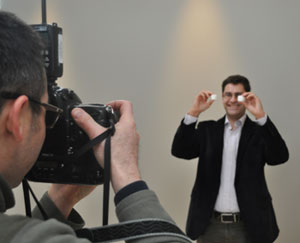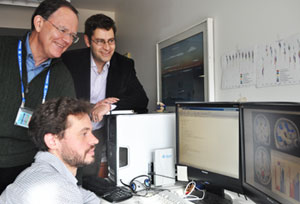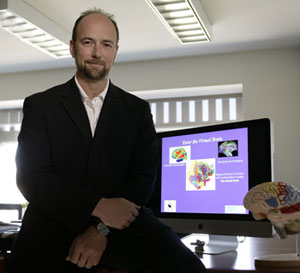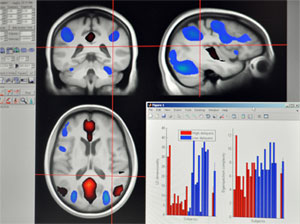January 22, 2013
Advanced brain imaging ‘analytic tools’ from Baycrest credited with helping make the discovery
Toronto, Canada – Using cutting-edge brain imaging analytic tools developed at Baycrest’s Rotman Research Institute (RRI), a team of neuroscientists has been able to predict with 71 percent accuracy people who are likely to be better or poorer at controlling impulsive behaviours.

Marc Berman, lead author of self-control study, holds two marshmallow props for Globe & Mail photographer Kevin Van Paassen.

Grigori Yourganov (foreground) with Stephen Strother and Marc Berman at Baycrest’s Rotman Research Institute.

Neuroinformatics expert Randy McIntosh, VP of Research and Director of the Rotman Research Institute.

Computer screen with brain imaging that would have been similar to what was used in analytics for this study.
The study, published today in the online journal Nature Communications, was a multi-centred effort that included cognitive scientists from Baycrest’s RRI, and the Universities of Washington, Michigan, California at Berkeley, Stanford, Toronto, Cornell and Columbia. The scientists had remarkable access to an iconic group of research subjects – now in their 40s and most from the San Francisco Bay area – who were part of Walter Mischel’s seminal “marshmallow” self-control experiments at Stanford from the late 1960s to the early 1970s as four-year-olds. This group had their self-control tendencies tracked over four decades by developmental, social and personality psychologists. In the original Stanford experiment, the children were asked to delay receiving a treat, such as a marshmallow, that was put in front of them for several minutes in order to receive a more desirable reward, such as two marshmallows. Some of the children weren’t able to wait and opted to receive the less desirable treat available without delay.
There are few, if any, samples of people like this in the world that have been tracked so rigorously by psychologists over such a long period of time. Although they had similar socio-economic backgrounds, the participants differed in their self-control abilities: whereas some individuals tended to struggle with self-control, others were quite adept at self-control. Studies have shown that children who were able to control their impulses in young childhood tended to do better in adolescence and adulthood, with lower levels of substance abuse, higher SAT scores (for U.S. college entrance), and lower body mass index.
Enter a talented team of neuroscientists led by Marc Berman, a post-doctoral fellow at Baycrest’s RRI and recently named the American Psychological Society’s Rising Star for 2013. The team was given privileged access to scan the brains of the former preschoolers, now in middle adulthood. The researchers designed a self-control experiment that involved working memory – remembering certain target words and ignoring distracter words. While the study participants performed the mental tests, their brains were scanned with functional magnetic research imaging (fMRI) which detects where activity is happening in the brain. Examining the fMRI scans, Berman and his team were able to predict with 71 percent success which patterns of brain activity belonged to the “high delayers” (individuals who had better-than-average control of their impulses from pre-school to adulthood) and which patterns belonged to the “low delayers” (those who had more difficulty with self-control). The high delayers showed more efficient brain network activity – that is, they used fewer brain network components when exercising self-control to ignore irrelevant information in working memory. The low delayers recruited a significantly larger number of brain network components – an indication of brain networks that may be operating less efficiently.
“It is remarkable that our participants, who have well-documented and reliable life-long patterns of high versus low self-control abilities, exhibit distinct neural signatures that may represent a biological marker of self-control ability,” said Berman.
It’s a discovery that would not have been possible without the use of advanced brain imaging analytic tools developed by two senior scientists at the Rotman Research Institute, Drs. Randy McIntosh and Stephen Strother, and RRI graduate student Grigori Yourganov. The analytic tools used in this study build on ongoing research by Drs. McIntosh and Strother, who specialize in neuroinformatics – the application of computer science, mathematics and statistics to analyze information about the brain.
Implications of the study findings
Asked how this finding may help children who exhibit self-control difficulties or adults with life-long tendencies of impulsive behaviour, Berman replied: “If we understand the brain processes that contribute to good self-control behaviour, we may be able to develop interventions in future to help the brain function more efficiently.”
Berman’s research explores the brain mechanisms involved in controlling thoughts, feelings and behaviours, and how to improve those abilities. Prior to joining Baycrest in 2011, Berman received his PhD in Cognitive Neuroscience and Industrial and Operations Engineering at the University of Michigan.
The study was supported by a number of grants from the National Science Foundation and the National Institute of Mental Health.
About Baycrest
Headquartered on a 22-acre campus in Ontario and fully affiliated with the University of Toronto, Baycrest is a global leader in innovations in aging and brain health. Baycrest is unique in the world, combining a comprehensive system of care for aging patients, one of the world’s top research institutes in cognitive science (Rotman Research Institute), dedicated centres focused on mitigating the impact of age-related illness and impairment, and unmatched global knowledge exchange and commercialization capacity.
For more information on this press release or to interview lead author Marc Berman, please contact:
Kelly Connelly, Senior Media Officer
Rotman Research Institute
Baycrest Health Sciences
kconnelly@baycrest.org
416-785-2432